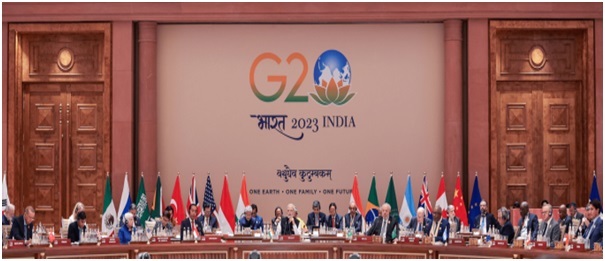The Shift to Eurasia: Global Order Changes with the G20-IMEC Plan (Indian Express)

- 21 Sep 2023
Why is it in News?
- At the 18th G20 Summit held in New Delhi, the US President, along with leaders from India, Saudi Arabia, UAE, France, Germany, Italy, and the European Commission, introduced the expansive India-Middle East-Europe Corridor (IMEC) project.
- This ambitious initiative aims to establish robust connections for India, including sea routes to the Arabian Gulf and a northern pathway connecting Saudi Arabia to Europe through Jordan and Israel.
Importance of the India-Middle East-Europe Corridor (IMEC):
- Shared Vision Embodied: The IMEC embodies a collective vision uniting nations with a combined GDP of approximately $47 trillion, constituting roughly 40 percent of the world's total GDP.
- This vision extends beyond trade, energy, and digital resilience.
- Pathway to an Interconnected Transoceanic System: The Corridor paves the way for a more interconnected transoceanic system, stretching from the Mediterranean region through West Asia into the vast Indo-Pacific.
- Recognition of Non-Western Powers: The IMEC signifies recognition by the US and EU of the ascent of non-Western powers and the undeniable shift of the global economic and geopolitical center eastward.
- It underscores the need to allocate more substantial global leadership roles to India, Saudi Arabia, and the UAE, key actors reshaping the future economic and geopolitical landscape in Eurasia.
- Influence of Emerging Powers: Abu Dhabi, Riyadh, New Delhi, and other emerging powers in Eurasia will wield significant influence in recalibrating broader power dynamics across the supercontinent.
How Will IMEC Impact the Global Order in Eurasia?
- Facilitating Diplomacy Between Hostile Nations: An often overlooked aspect of IMEC is how its very existence, along with its design and operational challenges, serves as another step toward bringing Saudi Arabia and Israel closer together.
- This initiative aligns with ongoing US-backed attempts to secure a normalization agreement between the two nations.
- Promoting Equitable Power Dynamics in Eurasia: IMEC aligns with the US's Eurasian strategy in a post-hegemonic era, aiming to establish a more balanced power structure across the wider Eurasian landscape.
- The objective is to prevent a loose coalition of states, including China, Russia, and Iran, from dominating the supercontinent.
- Instead, it seeks to bolster the influence of countries like India, Saudi Arabia, and Japan, enabling them to project economic and geopolitical power and contribute actively to a balanced Eurasian power structure.
- Europe Embracing Multipolarity Beyond Its Borders: Particularly for Europe, the Corridor represents a significant effort to attain geopolitical relevance and unity beyond the European continent in a new multipolar reality.
- Countries such as Italy, Germany, and France are aligning their efforts with the United States and Asian powers, aiming to move beyond occasional maritime exercises in the Indo-Pacific and integrate their economic systems into high-growth markets in the East.
How Will IMEC Serve India's Geopolitical Interests?
- Enhancing Strategic Engagement with the Arab World: The Indian government now has a unique opportunity to establish enduring connectivity between India and the Arabian region.
- This initiative will reassert India's role as a driving force in shaping regional connectivity.
- Bypassing Pakistan's Veto: For decades, Pakistan had staunchly opposed granting India access to land-locked Afghanistan and Central Asia.
- The successful implementation of this project will provide India with an alternative route to connect with Central Asia and Europe, circumventing Pakistan's objections.
- Strengthening US-India Cooperation in the Middle East: While conventional wisdom suggested that India and the United States primarily collaborated in the Indo-Pacific, with limited common interests in the Middle East, this perception changed when India and the US, alongside Israel and the UAE, established the I2U2 forum to develop joint economic projects.
- The India-Arabia-Europa corridor could prove to be even more impactful.
IMEC and Its Relationship with China:
- The US and EU might be inclined to present IMEC as a potential counterpart to China's Belt and Road Initiative.
- For Delhi, Abu Dhabi, and Riyadh, whether as existing (in India's case) or new members (in the case of Saudi Arabia and the UAE) of the BRICS group, IMEC symbolizes the emergence of a West Asian framework.
- Within this framework, countries like India, Saudi Arabia, the UAE, Oman, and Egypt are steadily expanding their integration, encompassing aspects beyond energy, remittances, and ideology.
Way Forward
- Preserving the Significance of the Corridor Launch: The symbolism associated with the Corridor's launch in New Delhi and the absence of Russia and China at the Summit should not be underestimated. It's crucial to avoid drawing misguided conclusions from this symbolism by the US and EU.
- Embracing a Balanced Approach: For countries like India, Saudi Arabia, and the UAE, the pursuit of a balanced Eurasian structure doesn't necessitate forming a coalition aimed at containing China and Russia.
- The Russian President's statement that the IMEC complements Russia's North-South project should be considered in this context.
- Ensuring IMEC Success: The success of IMEC hinges on several critical factors, including conducting a pragmatic assessment of each nation's motivations for participation, advancing the project beyond a Memorandum of Understanding (MoU), addressing logistical challenges, and prioritizing elements like electricity, digital connectivity, and clean hydrogen during the Corridor's initial phases.
- Addressing Security Concerns: The IMEC nations should also proactively address potential security challenges that may arise due to increased Eurasian connectivity.
- The inauguration of IMEC represents a noteworthy step in the evolving global power dynamics, with a clear shift towards the East.
- It underscores the dedication of the US, Europe, and emerging players like India, Saudi Arabia, and the UAE to foster a more equitable and interconnected Eurasian arrangement.
- The success of IMEC has the potential to set a precedent for future transcontinental initiatives seeking to establish a more balanced Eurasian framework.
Mains Question:
- Elaborate on the implications of the India-Middle East-Europe Corridor (IMEC) launch for the global power shift, highlighting the potential influence on India including global power dynamics and future transcontinental initiatives. (15M)
